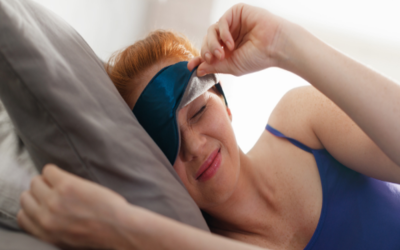Just spending eight hours in bed does not mean you meet the minimum recommended hours of sleep.
[the_ad id=”6084″]
The number of times you wake up or the time you spend tossing and turning before you fall asleep affects your sleep quality and quantity. The other important factor that affects sleep is stress. Apart from these apparent causes, the following reasons can also interfere with sleep:
1) Body and Room Temperature
The temperature really matters. If the room or your body is too warm at night, you will have a hard time falling asleep. Maintain your bedroom temperature at around 65 ℉ or 18 ℃. When you are sleeping, your body’s core gets cooler, but the hands and feet get warmer. You can prevent your body from getting too warm and disturbing your sleep by maintaining normal to cooler room temperature.
2) Blue Light
Blue lights have shorter wavelengths and produce large amounts of energy. Blue lights, which get emitted by our laptop screens and smartphones, throw the body off balance. If you spend some time staring at your smartphone before falling asleep, the emitted blue light can stimulate your brain, making it difficult for you to get deep sleep. An hour before you fall asleep, read a book and limit phone time.
3) Frequent Daytime Naps
We know a 20-minute afternoon nap can re-energize you and make it easy to tackle the rest of your day. But, most of us find it challenging to get up after 20 minutes and tend to extend our nap time. Taking a long nap or frequent daytime naps can throw off the natural sleep-wake cycle of our body, making it difficult for you to fall or stay asleep at night. If it is absolutely necessary, take only one 20-minute nap a day.
4) Caffeine
This is the most obvious cause of sleeplessness. Caffeine, found in coffee, is a natural stimulant. Most of us know that a cup of coffee in the evening can prevent you from falling asleep early at night. But what most of us do not realize is that other things, such as soft drinks, dark chocolate, etc., also contain caffeine. Excess consumption of any caffeine-containing product can result in restlessness, abdominal cramps, increased heart rate, and frequent urination. All these side effects can keep you up all night.
5) Sleep Disorders
Disturbed sleep once in a while is not an issue, but if you experience sleep disturbances 3 to 4 days in a week for a few months, it can be due to a sleep disorder. Insomnia, sleep apnea, sleepwalking, sleep talking, narcolepsy, and restless leg syndrome are examples of the most common sleep disorders. If you feel you are suffering from a sleep disorder, consult a doctor online.
6) Diet
Consuming food high in calories and fat at night has shown to affect sleep. A midnight snack might sound tempting, but consuming a lot of it can affect sleep quality. Make sure you do not eat anything a couple of hours before you go to bed. Eating a meal low in carbohydrates and high in proteins can make you feel full and help you fall asleep faster.
Source

